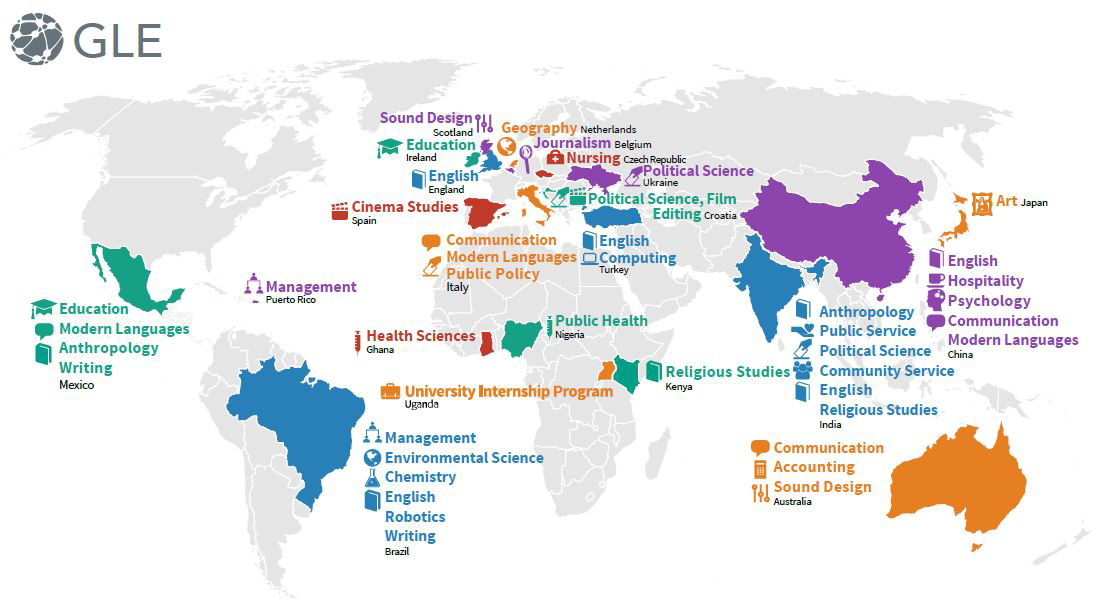 By the end of the 2018-19 academic year, DePaul faculty will have taught nearly 100 GLE courses, connecting DePaul students with classrooms in 24 countries on five continents. (Graphic courtesy of the Office of Global Engagement)
By the end of the 2018-19 academic year, DePaul faculty will have taught nearly 100 GLE courses, connecting DePaul students with classrooms in 24 countries on five continents. (Graphic courtesy of the Office of Global Engagement)
Local reality for DePaul students sitting in Lincoln Park and their classmates in rural Colombia will be worlds apart when they study together in a new College of Education course.
The differing effects of globalization, modern schooling and the western consumer culture will be evident in their international digital laboratory—and through shared readings, films, and life history projects they will create jointly.
Bringing students from around the world together using technology is the idea behind DePaul’s Global Learning Experience. The initiative, known as GLE, enables faculty and students to collaborate on joint projects and interact with classrooms in other countries without the time and expense of travel.
Stephen Haymes, a Vincent de Paul associate professor of education, redesigned a College of Education course to offer a transnational intercultural experience for students in Chicago and Colombia.
For more than a decade, Haymes has worked with the Comisión Intereclesial Justicia y Paz, a Colombian human rights non-governmental organization, to support communities that returned to their land after enduring terror, political violence and forceful displacement. He has collaborated on various projects with Escuela Normal Superior, which prepares critical rural educators, and formed an enduring and collaborative relationship.
Now, he and Sandra Milena Perdomo Méndez, a professor of English Learning Education/Intercultural Communication & Child and Human Development at Escuela Normal, will take that relationship a step further.
“Escuela Normal teachers are people who come from the marginalized neighborhoods, being descendants of rural displaced families,” according to Perdomo. “These students assume education as the main power not only to transform their life, but also their children’s and family’s lives,” she explains.
In their GLE course, students will work in small groups with their counterparts to learn the roots of classmates’ names and exchange life histories. Students will use WhatsApp, Skype and Zoom for conversations and create videos to share the experiences and environments that shaped them.
“The experience of thinking about themselves, writing about themselves and narrating themselves fosters a sense of empathy, motivation and attitudes towards their peers and communities, strengthening the social fabric,” Perdomo says.
Haymes agrees. “Globalization is lived differently. The ideas of happiness in the ‘schooled societies’ of the Global North often equate ‘self-improvement’ with job preparation, income, consumerism and individual success. For dispossessed rural peoples in the Global South, happiness is convivial relations. It’s being joyfully connected to each other, to land and territory, healing their socionatural worlds, and enabling communal futures.”
The class will minimize communication challenges using “translanguaging,” an approach to language learning in which students translate key words and phrases and incorporate them into their presentations, using a Spanish-English glossary they create for guidance. It’s an intercultural strategy that helps students learn the words others use to describe their lives, according to Haymes.
GLE has grown significantly since it began in 2013-14. With seven of DePaul’s 10 colleges and schools offering virtual international learning experiences as part of their curricula, approximately 690 students will have participated in a GLE during this academic year, more than a 100 percent increase over last year. In just five years, GLE has nearly doubled the number of DePaul students engaging in short-term global experiences, with GLE numbers matching participation in short-term faculty-led study abroad programs.
GianMario Besana, associate provost for Global Engagement and Online Learning, is excited by the increase in faculty submitting proposals. There have been 66 to date, resulting in nearly 100 GLE courses taught by the close of academic year 2018-19. These courses have connected DePaul students with students in 24 countries on five continents.
The university’s
Center for Teaching and Learning provides 20 hours of training for faculty and their international partners to help them plan joint learning experiences. Faculty receive $3,500 for travel to support their projects.
“GLE expands access to transformative international experiences for students who, traditionally, have been underrepresented among those who travel abroad to study,” Besana says of the program’s contribution to the
Grounded in Mission strategic goal encouraging students to increase their multicultural competencies.
GLE is attracting attention beyond DePaul. Besana recently presented it to a global audience via an
Aspen Institute Stevens Initiative webinar addressing diverse institutional approaches to the same pedagogical practice.